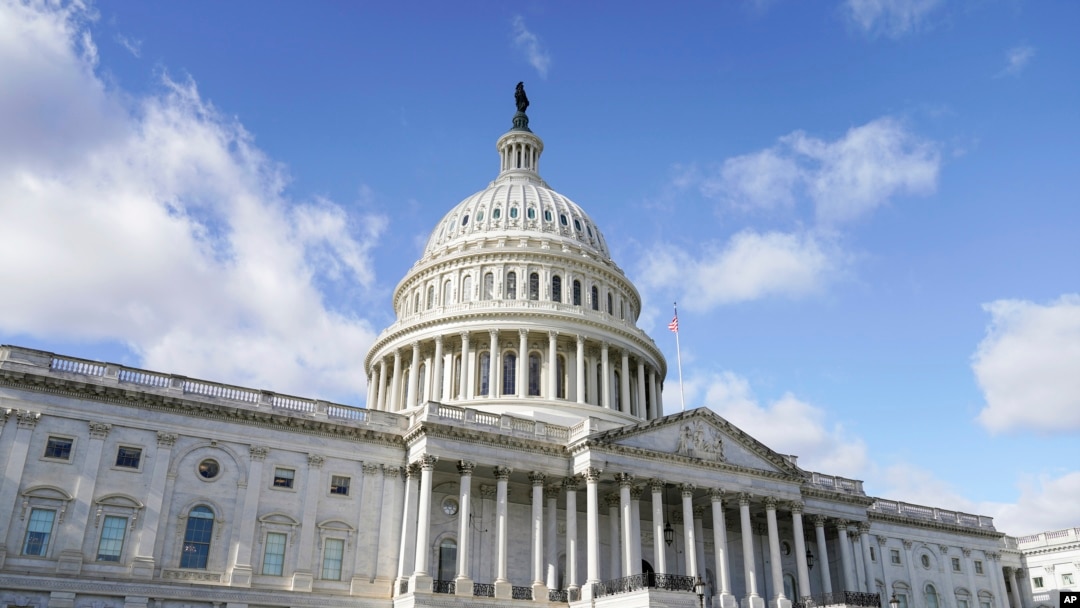U.S. lawmakers will work into the Christmas holiday next week, seeking to negotiate a deal on border security in return for Republican votes to send more aid to Ukraine.
“Challenging issues remain, but we are committed to addressing needs at the southern border and to helping allies and partners confront serious threats in Israel, Ukraine and the Indo-Pacific. The Senate will not let these national security challenges go unanswered,” Senate Majority Leader Chuck Schumer and Senate Minority Leader Mitch McConnell said in a joint statement late Tuesday.
“As negotiators work through remaining issues, it is our hope that their efforts will allow the Senate to take swift action on the national security supplemental early in the new year,” the statement continued.
Schumer told reporters earlier Tuesday that while he is optimistic about the progress of negotiations, lawmakers need more time.
“The details in this matter immensely, because this is not a topic that Congress has tackled in many years. We know that this is going to be not easy to do,” said the Senate’s top Democrat. “But we know too, that we must get it done. And while we've made important progress over the past week on border security, everyone agrees on both sides that it takes more time.”
Senate Minority Leader Mitch McConnell also acknowledged the difficulties, noting the last major piece of legislation on immigration and border security became law in the late 1980s.
“We haven't passed a significant immigration bill since Reagan’s second term. This is not easy. But we're working hard to get an outcome because the country needs it, and the country needs it soon,” McConnell told reporters Tuesday, referring to former president Ronald Reagan who served in the 1980s.
The United States has already dedicated more than $100 billion to arming and supporting Ukraine since Russia launched its full-scale invasion in February 2022, and President Joe Biden has asked Congress to approve another $60 billion. Republicans in Congress have become increasingly skeptical about the need to continue underwriting Ukraine's defense.
In recent weeks, Republicans in the Senate have conditioned approval of any additional money for Ukraine on the simultaneous strengthening of immigration rules aimed at reducing the number of people illegally entering the United States at its southern border and expelling some who are already in the country.
SEE ALSO: Lawsuit Challenges Texas Efforts to Restrict Illegal Border CrossingsThe White House has warned there is only enough for one more military aid package to Ukraine before funding runs out at year’s end.
“The United States has done the preponderance of military support,” Colin Cleary, an adjunct professor at the George Washington University and a veteran of the Foreign Service who served in Ukraine, told VOA.
“The crisis really would be on the military side if aid didn't happen. And in those two dimensions — the positional warfare that requires a lot of ammunition and supplies, and also the protection of the civilian infrastructure through air defense,” he said.
SEE ALSO: US Lawmakers Still Negotiating Ukraine Aid Deal as Holidays NearEven if an agreement passes in the Senate, it might not survive in the House, where Republicans hold a very narrow majority. A significant group of Republican House members opposes additional aid to Ukraine, and the party recently voted out a speaker who partnered with Democrats to pass legislation.
FILE - Speaker of the House Mike Johnson, R-La., talks with reporters at the Capitol in Washington, Nov. 2, 2023.
House Speaker Mike Johnson, who took over after predecessor Kevin McCarthy was ousted, has said that more funding for the border is essential to any Ukrainian aid package; however, he also wants more conditions placed on the aid.
"What the Biden administration seems to be asking for is billions of additional dollars with no appropriate oversight, no clear strategy to win, and none of the answers that I think the American people are owed," he said last week.
International reaction
Last week, Russian President Vladimir Putin publicly celebrated the fact that Ukraine appears to be losing support in the West.
"Ukraine today produces nearly nothing; they are trying to preserve something, but they don't produce practically anything themselves and bring everything in for free," he said, according to The Associated Press. "But the freebies may end at some point and apparently it's coming to an end little by little."
While opponents of aid to Ukraine often denigrate aid packages as being a "blank check" handed over to the Ukrainian government, most of the aid is in the form of military hardware. The dollar figures in the aid packages mostly represent money spent in the U.S. to pay arms manufacturers for the equipment the U.S. ships to Ukraine.
SEE ALSO: How the US Keeps Funding Ukraine's Military — Even as It Says It's Out of MoneyUkrainian President Volodymyr Zelenskyy said on Tuesday he was confident the U.S. would not "betray" his country by withholding crucial wartime funding as it fights off a Russian invasion.
"We are working very hard on this, and I am certain the United States of America will not betray us, and that on which we agreed in the United States will be fulfilled completely," Zelenskyy said during a televised news briefing in Kyiv.


